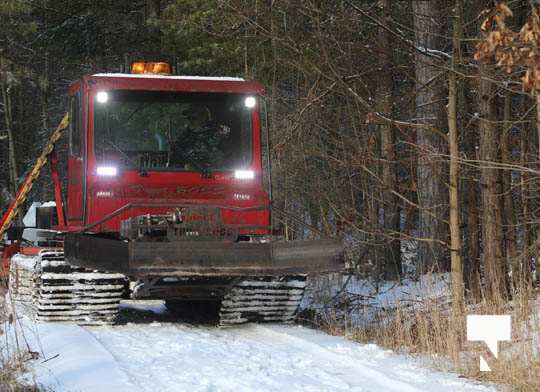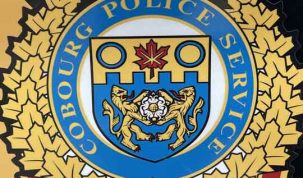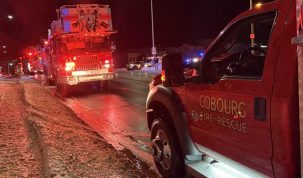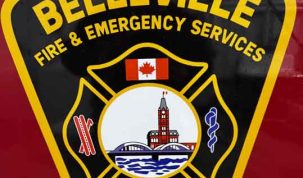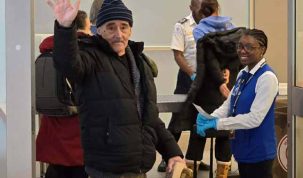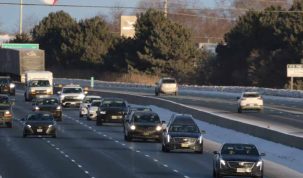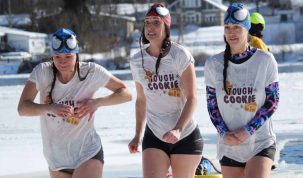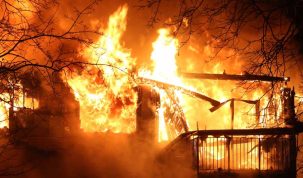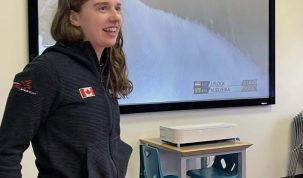By Cecilia Nasmith/Today’s Northumberland
As the winter weeks go by, snowmobiling is not being permitted in Northumberland Forest for lack of an agreement between Northumberland County and the Great Pine Ridge Snowmobile Association, under which snowmobilers would be permitted access.
With no agreement, the county’s press release said, the trails remain closed.
The county issued a press release that indicated liability is their major concern. They have drafted an updated agreement that would strengthen protections for the county and local taxpayers from liability and risk exposure related to snowmobiling in the county forest.
“As a motorized sport, snowmobiling includes a higher degree of risk for accidents and injuries than many other recreation activities permitted in the Forest,” the press release noted.
Northumberland MPP David Piccini has written a letter to the county on behalf of snowmobilers who have expressed their concerns about the proposed agreement, “to strongly object.”
“The agreement, as it stands today, is unreasonable and exposes volunteers in our community to unnecessary liability,” the letter said.
For one thing, it is inconsistent with standard and non-standard agreements across the province, preventing local snowmobilers from accessing the trail network that links with a broader network across Southern Ontario.
Specific objections were set out, including terms for termination of the agreement. The one proposed is not reciprocal to both parties and provides for termination in seven days instead of the usual 30.
Trail standards set what he termed unreasonable expectations in great detail right down to widths, treads and clearings. Also, he wondered, why are snowmobilers the only user group required to sign on to this – and why no public consultation.
Requirements around recording maintenance activities seem onerous, Piccini concluded, when logs are required from snow groomers owned by the Ontario Federation of Snowmobile Clubs.
Added difficulty and cost will result, as well, from the requirement for a GPS “ping” to be sent every two minutes instead of every 10 minutes.
Piccini also interprets requirements to place the GPRSA volunteers under obligation to have the same level of training and understanding of risk management as county staff – an unreasonable obligation, he argued.
“This policy imposes the same performance expectations of a paid government staff on unpaid volunteers,” he commented on the Code of Conduct requirements.
His final set of comments had to do with liability and indemnity.
“This waiver releases the county from all liability including willful negligence or neglect This includes any decision by the county,” Piccini wrote.
“Why would the user groups, who are volunteers, want to sign this?”
It is easy to interpret Clause 21 as holding the GPRSA users accountable for things unrelated to association activities, such as “the use or operation of any snowmobile or other vehicle anywhere in the county forest” and “the use or operation of any snowmobile or other vehicle while accessing or leaving the county forest.”
The government is here to serve the people, he argued.
“If county staff are negligent in a manner that adversely affects the GPRSA, they should be held responsible,” Piccini declared.
Piccini’s arguments did not specifically address a key problem spotlighted in the press release – the structure of the current liability laws that apply.
“Municipalities are facing growing liability and insurance costs due to the principle of Joint and Several Liability,” the announcement explained.
“Under this legal framework, if the plaintiff in a lawsuit is awarded damages, and the County is found to be even one (1) per cent responsible, the County could be liable for 100 per cent of a plaintiff’s damages should the other defendants to the lawsuit be unable to pay. A serious claim could result in the County paying millions of dollars in damage awards, even if deemed responsible for only a fraction of the fault, with these costs then passed on to residents and businesses through necessary property tax increases.
“As a steward of taxpayer dollars, the County is seeking an updated agreement with the snowmobile club to mitigate this risk.”
Warden Bob Crate added his own comment in the press release.
“Northumberland County is striving to ensure that snowmobilers can continue to enjoy the trails in the county forest this winter and in the future. However, local taxpayers cannot disproportionately subsidize the risks related to this activity,” Crate said.
“The county forest is a place where residents and visitors can come to enjoy outdoor recreation and connection with nature, and council recognizes that both are vital to physical and mental well-being, particularly during the COVID-19 pandemic.
“The County appreciates its long-standing collaboration with the GPRSA to ensure snowmobile enthusiasts are able to access the forest trail network, and we want this to continue. We are hopeful that we can get an updated agreement in place that enables snowmobilers to get back out on the trails while ensuring an acceptable level of risk for the county and Northumberland taxpayers.”
Piccini pointed out that closing the forest to snowmobilers will have a negative impact on the local economy.
“But most importantly, it robs the people we represent of one of the most important winter pastimes during these incredibly challenging times.
“Snowmobiling, a Canadian invention, is an important winter sport and pastime for millions of Canadians and thousands in the community we represent. It offers an important respite for many in today’s difficult times, brings families together and gets them outdoors.
“In fact, it is my understanding that in the few short days online petitions have been active, hundreds of the people we represent in Northumberland County alone.”
The issue of insurance and joint-and-several liability came up at Tuesday’s Audit and Finance Committee meeting of county council. Committee members voted to have the issue referred to the Feb. 16 regular meeting of county council.
Full letter from MPP David Piccini along with Northumberland County below:
Tuesday, February 2, 2021
1. Northumberland County Councillors
555 Courthouse Road
Cobourg, ON
K9A 5J6
Dear County Councillors,
I am writing to you today to strongly object to the non-standard agreement Northumberland County has put forward to the Great Pine Ridge Snowmobile Association (GPRSA) governing the terms under which snowmobilers can access the Northumberland Forest trail network. The agreement, as it stands today, is unreasonable and exposes volunteers in our community to unnecessary liability.
Snowmobiling, a Canadian invention, is an important winter sport and pastime for millions of Canadians and thousands in the community we represent. It offers an important respite for many in today’s difficult times, brings families together and gets them outdoors. In fact, it is my understanding that in the few short days online petitions have been active, hundreds of the people we represent in Northumberland County alone have strongly voiced their objection to the proposed agreement. I am writing to you on behalf of these people who have asked me to voice their concerns.
The agreement you have directed staff to propose stands alone in Ontario as a significant amplification of what is commonly included in thousands of standard and non-standard agreements across our Province. These are agreements that work in neighboring counties, with Conservation Authorities and landowners alike across our province. As it stands today, the agreement proposed has made snowmobiling untenable in Northumberland Forest, preventing snowmobilers from accessing the trail network that links with a broader network across Eastern Ontario. Closing our forest to snowmobile users will have a negative impact on our local economy; but most importantly, it robs the people we represent of one of the most important winter pastimes during these incredibly challenging times.
Here are my concerns with the current proposed agreement:
Termination Clause (Clause 2)
· The previous agreement used to contain a termination clause, reciprocal to both parties. This has been removed in the new agreement.
Why would both parties not have reciprocal terms for termination?
· Usually, these sorts of agreements have a 30 day termination clause, unless one party is in breach of the agreement. Compared to other “Standard” and “Non-Standard” agreements, this seven (7) day clause is much shorter.
Why would the County impose such terms on a volunteer group, such aggressive terms are not found in any other user agreement for Snowmobilers across Ontario?
· For comparison, review of the “Non-Standard” Agreements with Peterborough County, Eastern Ontario Trails Alliance, Kawartha Conservation Authority and Scugog all have thirty (30) day (or greater) termination clauses.
County’s Trail Standards (Clause 5)
· It is understandable the County has a document outlining the standards of their trails to ensure enjoyable experience for all users.
· I assert that this document goes above and beyond the reasonable expectation of what a volunteer group would be expected to do?
Is there not a duty to manage reasonable expectations for user groups, the people of our communities?
· Standards set out various widths, treads, clearings etc.
I worry this sets unreasonable expectations on a volunteer user group.
Why are snowmobilers the only user groups being asked to sign to this? It is understandable that motorized user groups would be held to a higher standard, and limited to specific trails in the forest, but this should be one equitably applied to all motorized vehicle user groups and one developed with public consultation?
Detailed Log of all Maintenance Activities, Including Snow Grooming (Clauses 6 &7)
· These records have been maintained by GPRSA, GPS records are embedded in groomers across Ontario.
· This would likely entail sending these logs to County. It is my understanding that groomers are owned by the OFSC.
· Currently, the GPS “ping” is sent every 10 minutes, and Northumberland County has stipulated it wants every 2 minutes. This adds an added cost and poses an unreasonable expectation on the GPRSA volunteers.
This is based on conversations with GPRSA volunteers and would need to be verified with County staff so if you could please clarify this for me that would be appreciated.
· It is questionable that any volunteer group would be able to reasonably meet such expectations.
I believe this stipulation poses unreasonable obligations on the user group.
· This adds another level of beaurocracy that is not present in other agreements across Ontario.
Hazard Analysis and Risk Identification form “Schedule C” (Clause 9)
· It would appear as if the expectation is that GPRSA volunteers would have the same level of training and understanding of risk management as County staff and would be expected to comment to County staff on such things.
I believe this stipulation poses unreasonable obligations on the user group.
· It is understandable that the County would have such a form and expectations of their own staff, but it is unclear if this would apply to basic grooming of trails? Clause 6 should clarify this, but it is somewhat unclear if this would apply to basic grooming.
Code of Conduct (Clause 13)
· The agreement stipulates that the GPRSA volunteers must abide by the County’s Code of Conduct (HR Policy 4.3.1).[1]
When clicking the link, it directs the user to the OAFVC website. One cannot easily find this code of conduct. The link does not work.
· This policy imposes the same performance expectations of a paid government staff on unpaid volunteers.
Typically, are paid government staff not held to a higher standard? These staff are also traditionally protected by unions and collective bargaining. This is likely one of the more egregious obligations posed on the user group. Not everyone has the luxuries, training opportunities or protections afforded to Government employees.
· This stipulation is not common among any of the “Standard” or “Non-Standard” agreements signed anywhere in Ontario.
Release, Waiver of Liability and Indemnity (Clause 20)
· This waiver releases the County from all liability, including willful negligence or neglect. This includes any decision by the County. Why would the user groups, who are volunteers, want to sign this?
· This provision is not common among any of the “Standard” or “Non-Standard” agreements signed anywhere in Ontario and is excessively broad.
Indemnity & Claims Clause (Clauses 21 & 22)
· Clause 21 could very easily be interpreted as holding the GPRSA user accountable for things unrelated to the Associations activities. The following language is problematic:
– “the presence of any person in the County forest”;
– The following was later added “arising from or related to this agreement” which should satisfy things.
– “the use or operation of any snowmobile or other vehicle anywhere in the County forest”;
– “the use or operation of any snowmobile or other vehicle while accessing or leaving the County forest”
· Clause 22 essentially waives the GPRSA from the ability to make a claim arising from negligence. This clause also includes problematic language identified above in the last two sub-bullet points.
· If County staff are negligent in a manner that adversely affects the GPRSA, they should be held responsible.
We (Government) are here to serve the people. It is grossly unfair to ask the people we are here to serve and represent to agree to be held responsible for terms we ourselves are not willing to accept responsibility for. This is made even more unfair, given these user groups who expect to reasonably enjoy the forest, are the taxpayers from whose coffers we operate the forest.
The riding of Northumberland – Peterborough South boasts strong and vibrant rural communities, comprised of many rural residents who strongly object to the terms of this agreement.
I ask you to prioritize finding a workable solution with the GPRSA before we lose the rest of the winter season.
We must find a reasonable balance between the very understandable need to protect the County, and terms and agreements that are acceptable to user groups that actually facilitate the enjoyment of this public forest by a diverse user group base. Our rural community is strong because of volunteers, like those at the GPRSA, who give of their time to ensure our residents can enjoy the vast trail network. By imposing unreasonable expectations and unnecessary liability on these volunteers, we run the risk of similar situations closing the trails to other user groups. If this happens, we all lose.
Thank you for taking the time to read my letter.
Sincerely,
David Piccini
Member of Provincial Parliament
Northumberland-Peterborough South
Snowmobile trails in the County Forest currently closed pending updated annual agreement
Northumberland County is advising residents that snowmobiling is currently not permitted in the Northumberland County Forest. County Forest trails are accessible to snowmobilers through an annual agreement between the County and the Great Pine Ridge Snowmobile Association (GPRSA). To date, the County and the snowmobile club have been unable to reach a mutually-acceptable agreement for the 2020/2021 season. Motorized trails in the Forest remain closed until an agreement is in place.
In late 2019, following a standard review of the existing annual Memorandum of Understanding with the club, Northumberland County proposed an updated license agreement that would strengthen protections for the County and local taxpayers from liability and risk exposure related to snowmobiling in the County Forest. As a motorized sport, snowmobiling includes a higher degree of risk for accidents and injuries than many other recreation activities permitted in the Forest.
Municipalities are facing growing liability and insurance costs due the principle of Joint and Several Liability. Under this legal framework, if the plaintiff in a lawsuit is awarded damages, and the County is found to be even one (1) per cent responsible, the County could be liable for 100 per cent of a plaintiff’s damages should the other defendants to the lawsuit be unable to pay. A serious claim could result in the County paying millions of dollars in damage awards, even if deemed responsible for only a fraction of the fault, with these costs then passed on to residents and businesses through necessary property tax increases. As a steward of taxpayer dollars, the County is seeking an updated agreement with the snowmobile club to mitigate this risk.
“Northumberland County is striving to ensure that snowmobilers can continue to enjoy the trails in the County Forest this winter and in the future. However, local taxpayers cannot disproportionately subsidize the risks related to this activity,” states County Warden Bob Crate. “The County Forest is a place where residents and visitors can come to enjoy outdoor recreation and connection with nature, and Council recognizes that both are vital to physical and mental well-being, particularly during the COVID-19 pandemic. The County appreciates its longstanding collaboration with the GPRSA to ensure snowmobile enthusiasts are able to access the Forest trail network, and we want this to continue. We are hopeful that we can get an updated agreement in place that enables snowmobilers to get back out on the trails while ensuring an acceptable level of risk for the County and Northumberland taxpayers.”
For more information about the current status of snowmobiling in the Northumberland County Forest, view our Frequently Asked Questions page at Northumberland.ca/snowmobiling.


